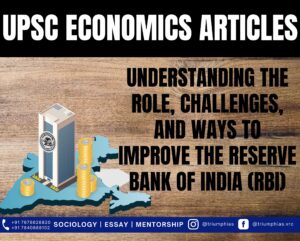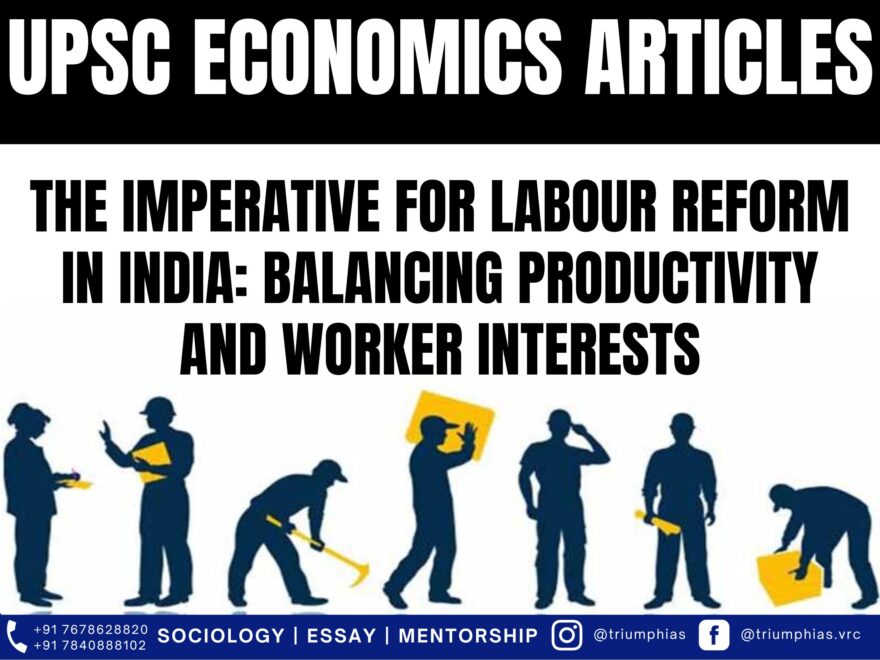Labour Reform
(Relevant for Economics Section of General Studies Paper Prelims/Mains)
Labour Reform
Labour reform essentially means taking steps in increasing production, productivity, and employment opportunities in the economy in such a manner that the interests of the workers are not compromised. Labour policy reforms in India are due for a long time, as the context in which they were framed has changed drastically.
Objectives of labour reform in India are as follows
- Promote enhanced formalization of the workforce by revising labor regulations, fostering improved industrial relations, and guaranteeing equitable remuneration, favorable working conditions, and comprehensive social security, all achieved through substantial enhancements in economic efficiency.
- Ensure the comprehensive consolidation of key central labor legislations.
- Boost the involvement of women in the labor force. A Niti Aayog report highlights a disconcerting decline in female labor force participation rates, plummeting from 49.7 percent in 2004-05 to 26.7 percent in 2015-16 within rural areas. Thus, it is imperative for the government to implement measures that bolster women’s involvement in the workforce.
- Disseminate publicly accessible information, acquired from thorough household and business surveys, along with innovative utilization of administrative data, on a quarterly basis by the fiscal year 2022-23.
Major constraints in labour reforms:
- Enhancing Productivity Across All Sectors: A significant portion of India’s workforce is engaged in low-productivity roles with minimal compensation. This is particularly evident in the informal sector, where wages can be merely a fraction of those observed in formal sector establishments producing similar goods or services.
- Securing Protection and Social Welfare: A substantial number of workers operating within the unorganized sector remain excluded from labor regulations and social safety nets. This dichotomous structure of the Indian labor market could be attributed to the intricate and extensive array of labor laws, which elevate the costs of compliance significantly.
- Deficiency in Skill Set: As highlighted in the India Skills Report 2018, a mere 47 percent of individuals graduating from higher education institutions demonstrate employable skills.
- Insufficient Employment Data: Presently, we lack timely and recurring workforce assessments. This absence of comprehensive data hampers our ability to systematically monitor the employment landscape and gauge the efficacy of diverse interventions aimed at fostering job creation.
Labour reform is a tedious process but once implemented, it will be beneficial for industries and ultimately help in job creation. As a country with a sizable youth population, we should strive to create a conducive atmosphere for industries for better employment generation. The reforms will give the required push for simpler labour laws, and help in economic growth.
Sample Question for UPSC Sociology Optional Paper:
1. Question: What is labour reform, and why is it crucial in the Indian context?
Answer: Labour reform aims at optimizing production, productivity, and employment while safeguarding workers’ interests. In India, it is crucial due to outdated labour laws, a large informal sector, and the need to increase economic efficiency and job creation.
2. Question: What are the objectives of labour reform in India?
Answer: The objectives include formalizing the workforce, consolidating key central labor legislations, improving women’s labor force participation, and disseminating timely employment data.
3. Question: Highlight the major constraints facing labour reforms in India.
Answer: The constraints include low productivity in many sectors, insufficient social welfare protection for unorganized workers, skills deficit among graduates, and lack of comprehensive employment data.
4. Question: Discuss the role of Niti Aayog in identifying issues related to labour reform in India.
Answer: Niti Aayog reports have highlighted significant issues like the declining rate of female labor force participation, providing valuable insights for policy formulation.
5. Question: How does the deficiency of employable skills among graduates impact labour reform objectives?
Answer: A skills deficiency hampers productivity and complicates the integration of young people into the workforce, thereby affecting the effectiveness of labour reforms.
6. Question: Explain the importance of formalizing the workforce in India.
Answer: Formalization can lead to improved working conditions, better wages, and social security benefits for workers, besides making regulatory compliance easier for employers.
7. Question: Why is the involvement of women in the workforce a key objective of labour reforms?
Answer: Increasing female participation is essential for gender equality, social empowerment, and to harness the full potential of human capital for economic growth.
8. Question: How does the lack of comprehensive employment data impede labour reforms?
Answer: Insufficient data makes it difficult to assess the labour market, plan effective policies, and monitor the impact of reforms.
9. Question: Explain the dichotomy between the formal and informal sectors in the Indian labour market.
Answer: The formal sector often offers better wages and social protections, while the informal sector comprises low-wage, unregulated employment lacking social security.
10. Question: How can labour reforms benefit the Indian economy?
Answer: Well-implemented labour reforms can lead to higher productivity, more equitable employment opportunities, and overall economic growth.
Related Blogs …
 |
 |
To master these intricacies and fare well in the Sociology Optional Syllabus, aspiring sociologists might benefit from guidance by the Best Sociology Optional Teacher and participation in the Best Sociology Optional Coaching. These avenues provide comprehensive assistance, ensuring a solid understanding of sociology’s diverse methodologies and techniques.
Labour Reforms, India, Productivity, Job Creation, Social Welfare, Economic Growth, Industrial Relations, Informal Sector, Employment Data, Skill Set, Niti Aayog, Labour Reforms, India, Productivity, Job Creation, Social Welfare, Economic Growth, Industrial Relations, Informal Sector, Employment Data, Skill Set, Niti Aayog

Choose The Best Sociology Optional Teacher for IAS Preparation?
At the beginning of the journey for Civil Services Examination preparation, many students face a pivotal decision – selecting their optional subject. Questions such as “which optional subject is the best?” and “which optional subject is the most scoring?” frequently come to mind. Choosing the right optional subject, like choosing the best sociology optional teacher, is a subjective yet vital step that requires a thoughtful decision based on facts. A misstep in this crucial decision can indeed prove disastrous.
Ever since the exam pattern was revamped in 2013, the UPSC has eliminated the need for a second optional subject. Now, candidates have to choose only one optional subject for the UPSC Mains, which has two papers of 250 marks each. One of the compelling choices for many has been the sociology optional. However, it’s strongly advised to decide on your optional subject for mains well ahead of time to get sufficient time to complete the syllabus. After all, most students score similarly in General Studies Papers; it’s the score in the optional subject & essay that contributes significantly to the final selection.
“A sound strategy does not rely solely on the popular
Opinion of toppers or famous YouTubers cum teachers.”
It requires understanding one’s ability, interest, and the relevance of the subject, not just for the exam but also for life in general. Hence, when selecting the best sociology teacher, one must consider the usefulness of sociology optional coaching in General Studies, Essay, and Personality Test.
The choice of the optional subject should be based on objective criteria, such as the nature, scope, and size of the syllabus, uniformity and stability in the question pattern, relevance of the syllabic content in daily life in society, and the availability of study material and guidance. For example, choosing the best sociology optional coaching can ensure access to top-quality study materials and experienced teachers. Always remember, the approach of the UPSC optional subject differs from your academic studies of subjects. Therefore, before settling for sociology optional, you need to analyze the syllabus, previous years’ pattern, subject requirements (be it ideal, visionary, numerical, conceptual theoretical), and your comfort level with the subject.
This decision marks a critical point in your UPSC – CSE journey, potentially determining your success in a career in IAS/Civil Services. Therefore, it’s crucial to choose wisely, whether it’s the optional subject or the best sociology optional teacher. Always base your decision on accurate facts, and never let your emotional biases guide your choices. After all, the search for the best sociology optional coaching is about finding the perfect fit for your unique academic needs and aspirations.
To master these intricacies and fare well in the Sociology Optional Syllabus, aspiring sociologists might benefit from guidance by the Best Sociology Optional Teacher and participation in the Best Sociology Optional Coaching. These avenues provide comprehensive assistance, ensuring a solid understanding of sociology’s diverse methodologies and techniques. Sociology, Social theory, Best Sociology Optional Teacher, Best Sociology Optional Coaching, Sociology Optional Syllabus.
Best Sociology Optional Teacher, Sociology Syllabus, Sociology Optional, Sociology Optional Coaching, Best Sociology Optional Coaching, Best Sociology Teacher, Sociology Course, Sociology Teacher, Sociology Foundation, Sociology Foundation Course, Sociology Optional UPSC, Sociology for IAS,
Follow us :
🔎 https://www.instagram.com/triumphias
🔎https://www.youtube.com/c/TriumphIAS
https://t.me/VikashRanjanSociology
Find More Blogs
|
Scope of the subject and comparison with other social sciences |
|||
|
|
|
|
Modernity and social changes in Europe |


